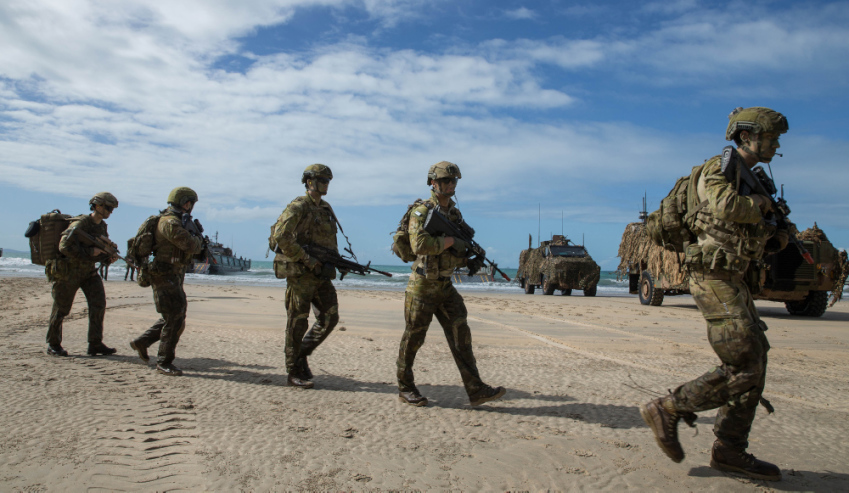DST human performance researchers Dr Susannah Whitney and Phil Temby have joined forces with Curtin University and the University of Western Australia to study individual and team performance in the Australian Army.
To continue reading the rest of this article, please log in.
Create free account to get unlimited news articles and more!
The projects with Curtin University and the University of Western Australia are two of the seven that formed the first tranche of the Human Performance Research Network (HPRnet) projects.
HPRnet was established by DST and Army in 2016 to help address Army’s top Human Performance research priorities. The innovative networking concept has since been used by DST’s Operations Research community (through ORnet), and by the Research Network for Undersea Decision Superiority.
Dr Whitney is working with Dr Troy Visser (UWA) examining ways to improve warfighter situational awareness (SA).
"Good SA is vital for soldiers operating in complex environments. But we need well-validated methods for identifying and measuring the cognitive skills that underpin it. With this project, we’re developing and trialling tools for assessing and training SA in the military context," Dr Visser explained.
Based on a model of mutual investment and open engagement, enduring partnerships are being created within the human performance research community as leading research teams from academic institutions across Australia work to provide cross-disciplinary expertise to enhance the cognitive and physical performance of military personnel.
Temby’s collaboration with Dr Daniel Gucciardi (Curtin University) is examining factors that contribute to Army team resilience. Dr Gucciardi’s team has identified a number of individual and team-level factors that form the basis of resilient teams. One of these factors is the cognitive abilities of individual team members.
To illustrate the partnering, Dr Visser cites his team’s key task to identify groups that could maximally benefit from multi-tasking training, and that had the time to participate in his research.
"Our DST partners played a key role in scoping several candidate groups for us. They arranged face-to-face meetings, and assisted in adapting research protocols for the Army context. These were vital tasks that could not have been done without their assistance," Dr Visser added.
Temby and Dr Whitney are keen to highlight the benefits of this type of in-depth partnering, saying, "We are genuine collaborators on these projects. For example, we have been actively involved in shaping the research questions, collecting, analysing and interpreting data, and contributing to written outputs. Working with the universities has helped to develop our knowledge, and provided opportunities to share our expertise about conducting research with Army."
Over the four-year model of the HPRnet projects, the university researchers have an opportunity to get out into the field, visit Army bases, work with different Army groups and get to know what Army life is like for a soldier. It’s valuable for the PhD students who are involved, getting that insight and exposure, and it means DST is able to influence the STEM pipeline across the national research landscape.
Army’s contribution to these projects has been the vital third component in the partnership.
"We’ve had fantastic support from Army units and people like Lieutenant Colonel Lee Melberzs and Major Sally Graham. Army has worked with us every step of the way on these projects, and they are also very much part of the research team," Temby explained.
Dr Whitney expanded on Temby's comments, adding, "Our military partners gave us a detailed understanding of the Army problem space, helped us build relationships with the units we’re collecting data from, and worked through the logistics of field data collection. We’re really enjoying working closely with them."
Over the last two and a half years, the Curtin and UWA teams have collected a variety of data from Army units relevant to measuring individual and team performance. UWA data is now being used by Curtin University to test its model of team resilience, and Curtin University’s data will help the UWA team to examine how cognitive, psychological and physiological factors impact on soldier situational awareness.
"For our team, HPRnet has provided us with the opportunity to generate new knowledge on an important area of research, as well as develop a ‘hands on’ understanding of human performance within Army. We expect to translate this new knowledge and experience into recommendations for Army as to how they can optimise team resilience within their units," explained Dr Gucciardi.
Dr Visser’s experience echoes this. He said working with DST through the HPRnet initiative has allowed his team to be able to translate that research into applicable outcomes for Army.
"DST provides the framework and the expertise to bring the academic and Army worlds together in a really meaningful way. The success of our project owes a lot to the enthusiasm from DST and Army for the HPRnet initiative," he said.
Stephen Kuper
Steve has an extensive career across government, defence industry and advocacy, having previously worked for cabinet ministers at both Federal and State levels.

 Login
Login








